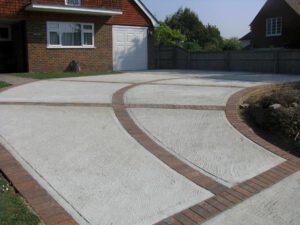Before you begin pouring concrete, you need to prepare the area for the job by removing any existing materials. Then, use a power drill to install concrete forms. Make sure the forms are evenly spaced and run in a single direction. A geotechnical engineer can provide you with more information about the properties of your soil. Concrete is best poured when it has a 28-day compressive strength of four thousand pounds per square inch, but this value may not be enough for some climates. You may also need to add a moisture-retaining barrier to the area by using a wet curing blanket, or by placing plastic sheeting on top of the concrete to prevent cracking.

A concrete driveway is subject to heavy wear and tear. Even the smallest crack can result in more serious damage, such as cracks, crumbling concrete, or the need to replace the entire driveway. The driveway is frequently subjected to freezing and thawing cycles, and this wears down the concrete. As a result, cracks, hairline fractures, and even loose spots can appear. To minimize these risks, you need to regularly inspect your driveway to determine whether it is suffering from a variety of damages.
Before you pour concrete for your driveway, you must first calculate the weight of the entire surface. Your driveway will cost more than you may think. Measure the length of the driveway from the drawing and multiply it by its width. Next, divide the length by 27. Add ten percent to account for mistakes. Also, remember to add on the cost of the base material, gravel, fabric underlayment, installation labor, and rebar or mesh wire. In addition to concrete, you must factor in the cost of permits.
The cost of a concrete driveway depends on where you live, where you are located, and how far the supplier is from your home. There are many options when it comes to concrete, including colored and textured surfaces. Depending on your preferences and location, it may be best to contact a local concrete supplier. Ensure that you choose a professional with the proper certification. Every municipality has different drainage requirements. You should also consider the quality of the aggregates used for the job.
When pouring concrete for your driveway, make sure you choose a thicker base than you originally planned. A three or four-inch thick pad is adequate for light vehicles, but if you have heavy vehicles, you will need a thicker slab. A thicker slab will give your driveway more strength. Most contractors pour residential concrete driveways between four and six inches thick, but this can vary. If your driveway is used often, you may want to go with a six-inch slab.
The cost of a concrete driveway is roughly four to seven dollars per square foot. This price will depend on how complex the design is, the materials used, and labor costs. A ten-by-20-foot driveway for a single car can cost between $800 and $1,600. A twenty-by-four-foot driveway for two cars costs approximately $2,300 to $4,600. Land excavation costs about $0.50 to one-hundred dollars per square foot.
Once installed properly, a concrete driveway can last for 30 years or more. Whether you’d like to use concrete for your driveway or other surfaces, it’s important to hire an experienced concrete services company to ensure that it’s installed correctly and will drain properly. You can also use high-quality concrete and mix your own concrete. However, a concrete driveway is only as good as the paving contractor that installed it. The experience of the paving contractor you hire for the job is critical to the final outcome.
Because concrete is a porous material, it requires some maintenance. You’ll have to periodically degrease the area to keep it clean. Unlike asphalt, however, concrete requires less maintenance and is more customizable. It is a good option for homeowners who intend to live in the area for a long time. This material is also relatively inexpensive. It’s also very durable. A concrete driveway should last you a long time.